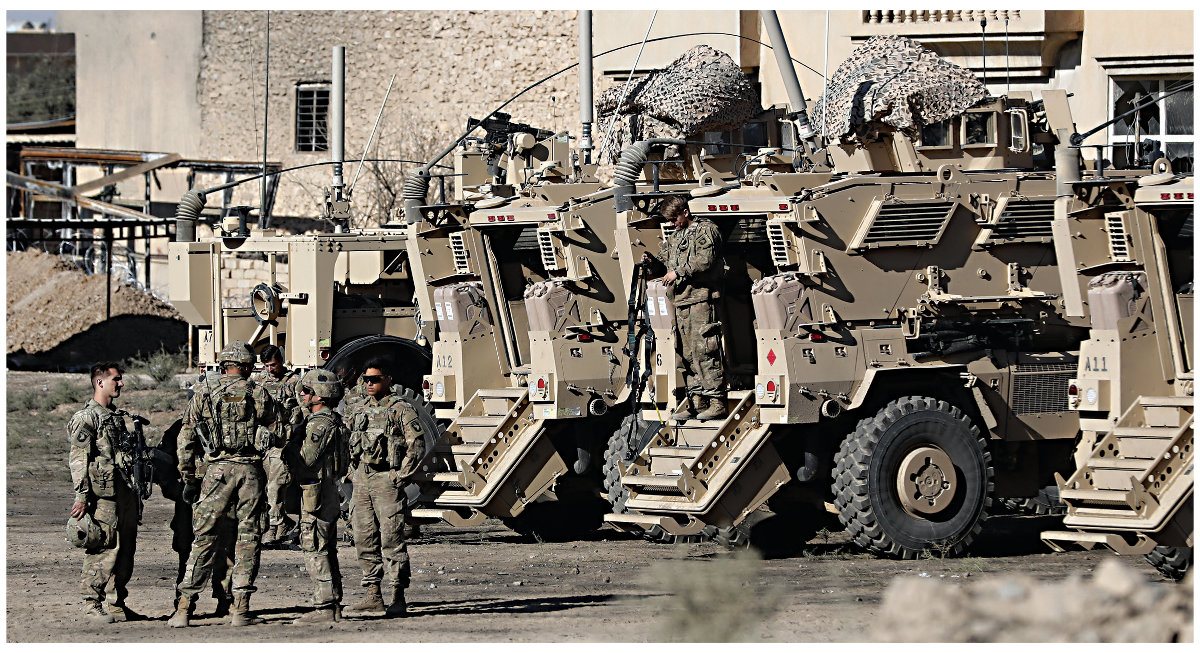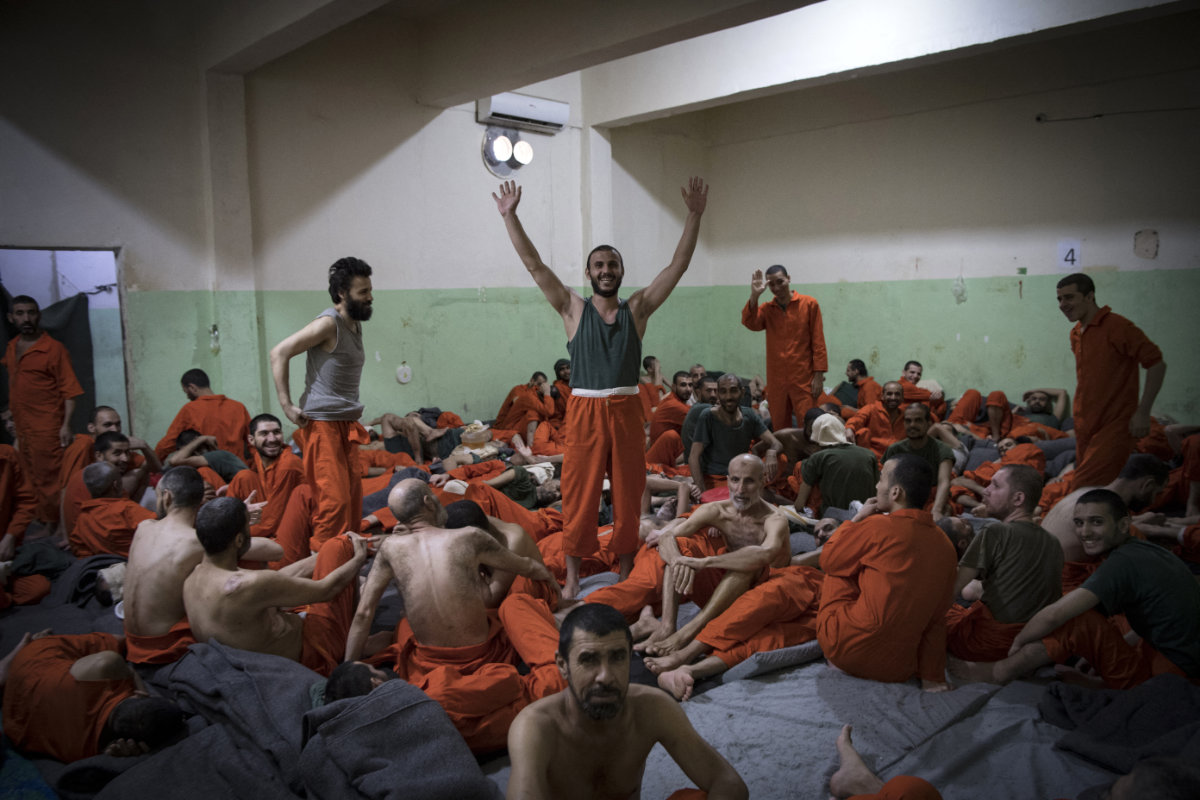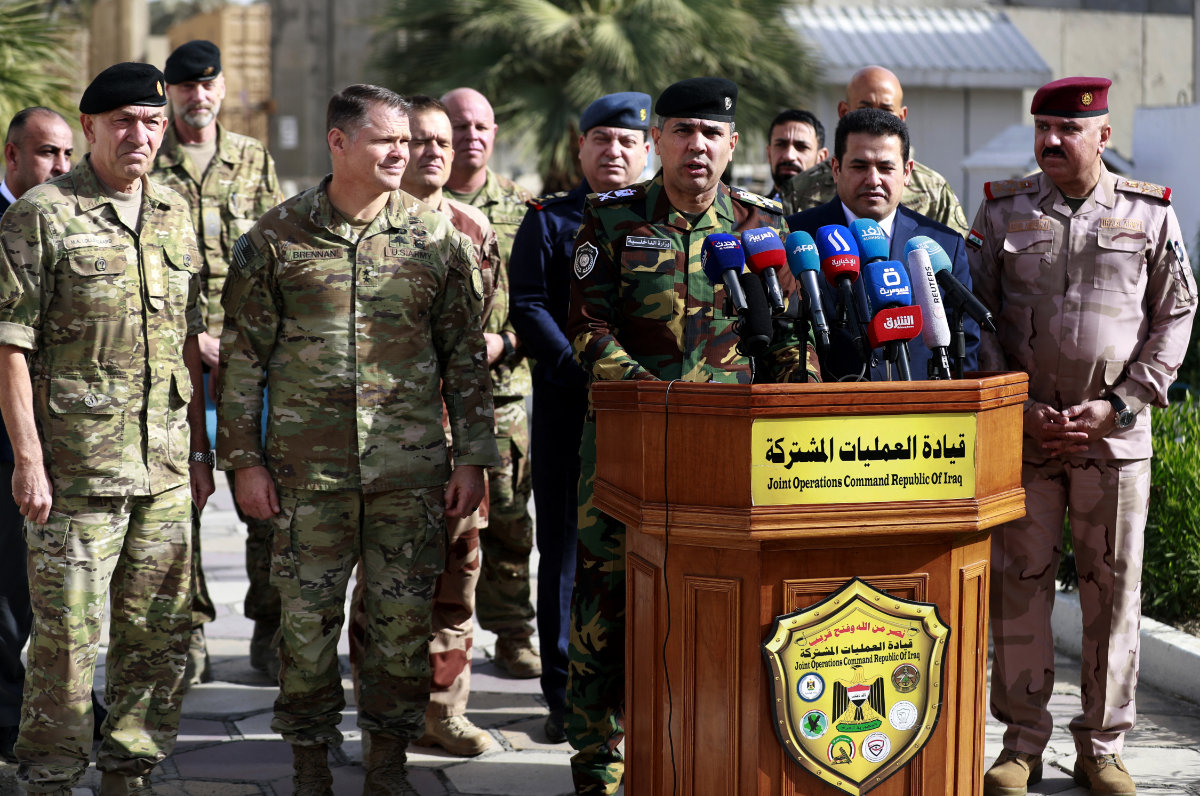LONDON: When Daesh extremists seized control of swathes of Iraqi territory in 2014, many wondered whether the onslaught could have been prevented had US troops not withdrawn from the country three years earlier.
As the militants surged into Iraq’s second-largest city, Mosul, there were reports of members of the Iraqi Security Forces stripping off their uniforms as they fled.
“We can’t beat them,” an unnamed army officer told Reuters amid the chaos. “They are well-trained in street fighting, and we’re not. We need a whole army to drive them out of Mosul.”
After three years of fierce fighting that took Daesh within 25 kilometers of the capital, Baghdad, the extremists were finally driven back and Mosul was liberated.
The gargantuan military effort was spearheaded by Iraq’s elite Counter Terrorism Service, bolstered by the return of American troops and the US Air Force.

Crack troops of the Iraqi Counter-Terrorism Services (CTS) advance in western Mosul's al-Islah al-Zaraye neighborhood on May 12, 2017 during an offensive to retake the area from Daesh jihadis. (AFP)
Images of the destruction in Mosul, along with the catastrophic impact of Daesh’s occupation, might be playing on the minds of Washington officials as they once again weigh whether or not to remove American troops still stationed in Iraq.
As it stands, the US and Iraq have agreed to end Operation Inherent Resolve — the US-led coalition’s mission to combat Daesh — by September. Most of the 2,500 US personnel in Iraq are scheduled to leave in the initial phase, with a small number remaining until 2026.
Many believe US President Donald Trump, acting under his isolationist tendencies, will want to hasten the withdrawal of those forces, or is unlikely to extend their stay if the Iraqi government requests it.
With reports of an increase in attacks by Daesh sleeper cells, fears of instability across the border in Syria, and with Iran looking to shore up its proxy militias in Iraq, there are concerns that another complete US withdrawal will once again leave the country vulnerable.
“The risk of premature withdrawal from Iraq is that the Iraqi Security Forces will lose critical operational and tactical support, and Daesh will seize the opportunity to reconstitute and once again terrorize the Iraqi people and state,” Dana Stroul, research director at the Washington Institute for Near East Policy and a former Pentagon official, told Arab News.
The mooted withdrawal of US troops comes more than 20 years after the US-led invasion of Iraq toppled Saddam Hussain, freeing the country from dictatorship, but ushering in a period of sectarian civil war.

File photo showing US soldiers near an Iraqi army base on the outskirts of Mosul during the fight against Daesh militants on November 23, 2016. (AFP)
US forces were drawn into cycles of violence and routinely became the target of two mutually antagonistic sectarian forces: Iran-backed militias and an insurgency in which Al-Qaeda played a prominent role.
When President Barack Obama took office in 2009, he vowed to end US involvement in the conflicts in Iraq and Afghanistan, but not without first ordering a massive troop surge in an attempt to salvage the mission.
In Iraq, where more than 100,000 people were estimated to have died in the violence, there was widespread public anger at the American presence. In the US, the war was also deeply unpopular with thousands of American soldiers having been killed.
Some American and Iraqi officials wanted to maintain a US military presence in the country, fearful of an Al-Qaeda resurgence. But attempts to negotiate an agreement for a reduced force failed and in October 2011 Obama announced that all of the remaining 39,000 US troops would be withdrawn by the end of that year, bringing a close to the mission.
The US spent $25 billion on training and equipping Iraq’s security forces up to September 2012, alongside Iraq’s own spending on fighter jets and other advanced materiel. So it was something of a surprise that Iraqi forces were so quickly overrun when Daesh launched its offensive in 2014, having emerged from the remnants of Al-Qaeda in Iraq.
Images of Daesh fighters driving around in US armored vehicles captured from the Iraqi military symbolized how quickly Iraq’s armed forces had deteriorated since the 2011 withdrawal.

An image grab taken from a propaganda video released on March 17, 2014 by the Daesh's al-Furqan Media militants with their flag as they stand on a captured armored vehicle in Iraq’s Anbar province. (AFP/File)
As the extent of Daesh’s brutality began to emerge, including the slaughter of the Yazidi minority and the beheading of Western hostages on YouTube, the US ordered its forces back to the region, as part of an international coalition, to fight the extremists in both Iraq and Syria.
After some of the most brutal urban warfare seen since the Second World War, Iraq’s then-prime minister, Haider Al-Abadi, declared the territorial defeat of Daesh in December 2017. US forces continued to help their allies in Syria to defeat the extremists there in March 2019.
By December 2021, US forces in Iraq no longer held combat roles, instead working on training, advisory, and intelligence support for the country’s military. The remaining 2,500 US troops are spread between Baghdad, Irbil in the semi-autonomous Kurdistan region, and Ain Al-Asad air base.
However, soon after Al-Abadi’s declaration of victory over the extremists, a new threat emerged in Iraq in the shape of Iran-backed militias, originally mobilized to help defeat Daesh. Having extended their reach over Sunni and Kurdish areas, these groups began attacking US bases with rockets and drones in a bid to force their immediate withdrawal.

Members of the Hashed al-Shaabi (Popular Mobilisation Forces) paramilitary unit take part in a parade in the northern Iraqi city of Mosul on December 10, 2024, to mark the nation’s victory against Daesh militants. (AFP)
These attacks, sponsored by Iran’s powerful Islamic Revolutionary Guard Corps, prompted President Trump, during his first term, to order the killing of militia chief Abu Mahdi Al-Muhandis and Iranian Quds Force commander Qassem Soleimani in a drone strike on their motorcade as they left Baghdad Airport on Jan. 3, 2020.
Soleimani’s death was a major setback for Iran’s proxies throughout the region, but the attacks on US positions did not subside. In fact, with the onset of the war in Gaza in October 2023, Iraq’s Shiite militias mounted a fresh wave of strikes, ostensibly in support of Hamas.
The deadliest of these occurred on Jan. 28, 2024, when three US personnel were killed and 47 wounded in a drone attack on Tower 22 just over the border in Jordan, prompting then-US president, Joe Biden, to order a wave of airstrikes on militia positions in Iraq.
Mindful of the need to protect its proxies in Iraq, at a time where Lebanon’s Hezbollah and Yemen’s Houthis have been weakened and the sympathetic Assad regime in Syria has fallen, Iran appears to have forsworn further militia strikes on US forces.

This picture taken on January 8, 2022, shows Iraqi Shiites commemorating the second anniversary of the killing of top Iranian commander Qasem Soleimani and Iraqi paramilitary commander Abu Mahdi al-Muhandis (posters) in the southern Iraqi city of Basra. (AFP)
The latest agreement to end the US presence was reached in September last year with the aim of moving to a fully bilateral security partnership in 2026.
Meanwhile, the US Defense Department announced in April it would be halving the number of troops in northeast Syria “in the coming months.”
An indication of Trump’s aversion to the continued US military presence came during a speech in Saudi Arabia while on his tour of the Gulf in May when he decried “Western interventionists.”
A clear concern surrounding a US withdrawal is whether Iraq’s security forces are now strong enough to withstand threats like the 2014 Daesh assault. The disastrous withdrawal from Afghanistan in August 2021 is also no doubt fresh in the minds of defense officials.
A recent report by the New Lines Institute think tank in New York said that a US withdrawal from Iraq would “heavily impede the intelligence and reconnaissance collection, artillery, and command-and-control capabilities of Iraqi military forces.”
The report studied quarterly independent audits for the US Congress between 2019 and 2024 to assess the capabilities of Iraqi forces. It looked at the three main forces in Iraq: the Iraqi Security Forces, Counter Terrorism Service, and the Kurdish Peshmerga.
The report said: “While segments of Iraq’s military, such as the CTS and Kurdish security forces, have proven efficient in counterterrorism operations, several gaps exist in Iraq’s conventional capabilities, including artillery, command and control, inter- and intra-branch planning, and trust.”

In this photo taken on October 20, 2016, Iraqi Kurdish Peshmerga fighters fire a multiple rocket launcher at a Daesh position near the town of Bashiqa, Iraq. Analysts fear that while segments of Iraq’s military, such as the CTS and Kurdish security forces called Peshmerga, have proven effective in the fight against Daesh, there are plenty of gaps in Iraq's national defense capabilities. (AFP)
The think tank said there were serious questions about whether Iraq’s security forces would be able to “hedge against internal and external challenges” in the absence of the US security umbrella.
The report’s co-author Caroline Rose, a director at New Lines, says the gaps in Iraqi capabilities “could reverse over a decade of progress that Operation Inherent Resolve has made in Iraq.”
“If the objective is still to advance Iraqi forces’ operational capacity, sustain gains against Daesh, and serve as a ‘hedge’ against Iranian influence, there is work still to be done,” she told Arab News.
While Iraq has enjoyed a period of relative stability, the threats to its national security continue to lurk within and beyond its borders.
The biggest fear is of a Daesh resurgence. Although the group has been severely depleted, it continues to operate cells in rural areas of Iraq and Syria, and has since made headway in Afghanistan, the Sahel, and beyond.
“Since January, the US military is still actively supporting the Iraqis,” said the Washington Institute’s Stroul. “There have been monthly operations against Daesh, including the killing of a senior leader in western Iraq. This tells us that Daesh is still a threat, and the US support mission is still necessary.”

Security analysts have warned that the huge number of Daesh prisoners in northeast Syria posses a threat to the region in case they break out. (AFP)
Another concern is that instability in Syria, where the embryonic, post-Assad government is facing significant security challenges, could again provide a breeding ground for Daesh that could spill across the border.
“There are still 9,000 Daesh detainees held in prison camps in northeast Syria,” said Stroul, adding that these present “a real risk of prison breaks that will replenish Daesh ranks and destabilize Syria, Iraq, and the rest of the region. If the security situation deteriorates in Syria, this will have seriously negative impacts in Iraq.”
And then there is the ongoing threat posed by Iran-backed militias. While these militias have been officially recognized as part of Iraq’s security apparatus, some believe the US presence in Iraq helps keep them — and, by extension, Iran — in check.
“The staging of US forces and equipment, combined with a deep Iraqi dependence on American technical and advisory support, creates an obstacle and point of distraction for Tehran and its proxies,” Rose said.
If the withdrawal of US troops from Iraq is inevitable, then how can Washington best prepare Iraq to go it alone?
For Rose, the US should play a “long game” to sustain security ties with Iraq and preserve the progress made under Operation Inherent Resolve.
She recommended the US continue investing in Iraq’s defense and security, conducting regular joint military exercises, and using its current presence in Irbil and Baghdad to build strong relations with security officials.
She also advised other international bodies, like the NATO Mission-Iraq and the EU Advisory Mission Iraq, to coordinate closely with the US as the drawdown gets underway.

This photo taken on December 9, 2021, shows Iraqi and NATO military officials at a press briefing after a meeting on the continuing campaign against Daesh at the Joint Operations Center in Baghdad. (AFP)
Although the US appears set on pivoting away from the region to focus strategic attention on the Asia-Pacific, some still hope there could be a way for America to maintain some form of military presence, given the rapidly evolving situation in the wider Middle East.
Reports earlier this year suggested some senior Iraqi politicians aligned with Iran privately want a US presence to continue, at least until ongoing US-Iran nuclear talks reach a conclusion.
“The US military mission is one of support, advice, and assistance by mutual consent of Baghdad and Washington,” Stroul, of the Washington Institute, said. “If the Iraqi government invites the US military to remain for some period of time, there should be agreement on the supporting role that the US can play.”
If Iraq hopes to maintain lasting stability, it needs to ensure its security forces can act alone to protect the country and population from internal and external threats.
Continuing to work with the world’s foremost military power, even in a limited capacity, would go some way to ensuring the horrors of 2014 are not repeated.





























